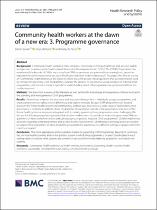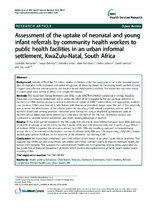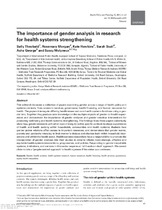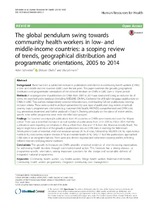| dc.contributor.author | Lewin, S | |
| dc.contributor.author | Lehmann, U | |
| dc.contributor.author | Perry, H | |
| dc.date.accessioned | 2022-08-03T20:53:06Z | |
| dc.date.available | 2022-08-03T20:53:06Z | |
| dc.date.issued | 2021 | |
| dc.identifier.citation | Lewin, S., Lehmann, U., & Perry, H. B. (2021). Community health workers at the dawn of a new era: 3. Programme governance. Health Research Policy and Systems, 19(S3). https://doi.org/10.1186/s12961-021-00749-3 | en_US |
| dc.identifier.issn | 1478-4505 | |
| dc.identifier.uri | http://www.health-policy-systems.com/ | |
| dc.identifier.uri | http://hdl.handle.net/10566/7670 | |
| dc.description.abstract | Background: Community health workers (CHWs) can play a critical role in primary healthcare and are seen widely
as important to achieving the health-related Sustainable Development Goals (SDGs). The COVID-19 pandemic has
emphasized the key role of CHWs. Improving how CHW programmes are governed is increasingly recognized as
important for achieving universal access to healthcare and other health-related goals. This paper, the third in a series
on “Community Health Workers at the Dawn of a New Era”, aims to raise critical questions that decision-makers need
to consider for governing CHW programmes, illustrate the options for governance using examples of national CHW
programmes, and set out a research agenda for understanding how CHW programmes are governed and how this
can be improved.
Methods: We draw from a review of the literature as well as from the knowledge and experience of those involved in
the planning and management of CHW programmes.
Results: Governing comprises the processes and structures through which individuals, groups, programmes, and
organizations exercise rights, resolve diferences, and express interests. Because CHW programmes are located
between the formal health system and communities, and because they involve a wide range of stakeholders, their
governance is complex. In addition, these programmes frequently fall outside of the governance structures of the
formal health system or are poorly integrated with it, making governing these programmes more challenging. We
discuss the following important questions that decision-makers need to consider in relation to governing CHW programmes: (1) How and where within political structures are policies made for CHW programmes? (2) Who implements
decisions regarding CHW programmes and at what levels of government? (3) What laws and regulations are needed
to support the programme? (4) How should the programme be adapted across diferent settings or groups within the
country or region?
Conclusion: The most appropriate and acceptable models for governing CHW programmes depend on communities, on local health systems, and on the political system in which the programme is located. Stakeholders in each
setting need to consider what systems are currently in place and how they might be adapted to local needs and
systems. | en_US |
| dc.language.iso | en | en_US |
| dc.publisher | BMC | en_US |
| dc.subject | Community health workers | en_US |
| dc.subject | Lay health workers | en_US |
| dc.subject | Governance | en_US |
| dc.subject | Governing | en_US |
| dc.subject | Health systems | en_US |
| dc.subject | Health workforce | en_US |
| dc.subject | Sustainable Development Goals (SDGs) | en_US |
| dc.subject | Universal Health Coverage | en_US |
| dc.title | Community health workers at the dawn of a new era: 3. Programme governance | en_US |
| dc.type | Article | en_US |




